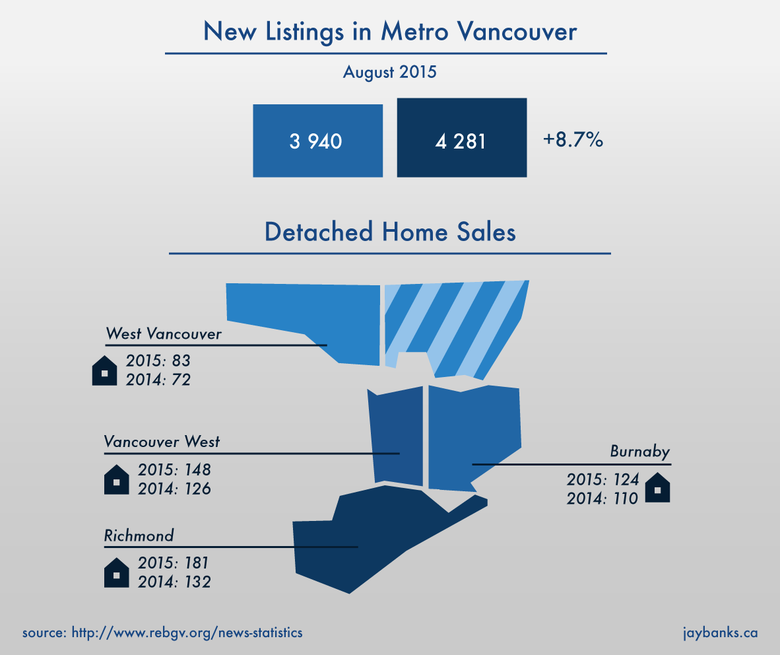They are out there. Buyers are searching everywhere. Eastside neighbourhoods that were low on desirability are now on the radar of those who can no longer afford to buy on the Westside of Vancouver. Between June and August 2015 home sales were between 25 and 30% higher than the ten year sales average according to the Real Estate Board stats.
First choice for buyers is a single family home. In Vancouver the city rezoned all neighbourhoods to accommodate 3 units per detached lot: main residence, basement suite, laneway house. A big help to heavy mortgage payments. Drawback is that all units must be under the same owner; no separation of title.
Other municipalities have not followed suit and some actively search for an illegal suite in a single family home. All this creates more pressure on prices which have risen 12% or more this year. Builders and buyers in Richmond are looking at the last of the larger lots near the West Dyke Trail in Seafair. Luxurious new homes in popular neighbourhoods may be standing empty but they are a symbol of owners who are applying to come to Canada or who are hedging their bets in China.
 Vancouver Downtown Office Buildings by Colin Knowles
Vancouver Downtown Office Buildings by Colin Knowles
In Vancouver ‘s old neighbourhoods there are empty homes, not rented, waiting to be razed. There is some talk that BC should enact a policy that empty properties must be occupied by local tenants . This rental rule has been instituted in Australia to prevent neighbourhoods of investment ghost towns.
Condos are an important part of the real estate economy. In Toronto many luxurious rental buildings are being built on sites zoned for condos. Both in Vancouver and Toronto there are those with good incomes who can’t afford to buy where they want to live. This has led to a big increase in prices for older condos in the downtown core as buyers choose affordable convenience. Anecdotally condos on Marinaside in Yaletown that sold in the $700-800ks earlier this year are now selling in bidding wars for a $100k more. It has also led to investment condos or luxury rentals going out at $3-4000 per month or more.
There is an increase in US and world buyers as the Loonie falls against the Greenback. There is now a 25% discount on Vancouver real estate to out of country investors. The tolerance and inclusion displayed in Canada and Vancouver in particular attract many buyers from many places who are under stress in their home locations either for cultural or religious reasons or personal safety concerns.
 New Listings and Detached Home Sales in August 2015
New Listings and Detached Home Sales in August 2015
The economic boom in the tech sector has also put pressure on downtown properties. Microsoft leased 143,000 s.f. of office space above Nordstrom’s in Pacific Centre in addition to their Vancouver Development Centre at 1111 W Georgia St. Amazon just leased 150,000 s.f. One reason large US companies looking for educated tech workers open branches in Canada is due to immigration policy. Companies can sponsor such workers into Canada where they can’t get visas for them into the US. Canada has a vested interest in such desirable immigrants choosing to settle in Canada long term.
In Vancouver the tech sector employs about 34,000 workers which is 12% of the office work force according to Garry Marr of the Financial Post. Toronto is now #5 in tech employment in North America and Vancouver is #20. Since many tech employers choose to locate in Gastown or Yaletown there is pressure on both rentals and condos in the area. The Aquilini family chose to develop their property adjoining BC Place as rental units when their surveys showed there would be more return than through the usual condo sales process.
The general consensus of economists is that Vancouver is pretty well insulated against a big change in the market due to outside money coming into the economy. However there are outside forces like the drop in the stock market in China that must be taken into consideration. A rise in mortgage interest rates would impact affordability in some sections of the market. Outside money is usually not affected. RBC released a report stating that Vancouver was becoming more unaffordable and Barbara Yaffe commented that the RBC graphs showed ownership costs of a detached bungalow in Vancouver consumes 80% of household income compared with 42% nationally and 59% in Toronto. A senior economist with RBC stated that Vancouver has to face up to increased density in order to provide housing to those who want to live and work in the Lower Mainland.
JB00DT

